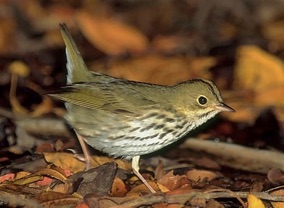The Ovenbird
There is a singer everyone has heard,
Loud, a mid-summer and a mid-wood bird,
Who makes the solid tree trunks sound again.
He says that leaves are old and that for flowers
Mid-summer is to spring as one to ten.
He says the early petal-fall is past,
When pear and cherry bloom went down in showers
On sunny days a moment overcast;
And comes that other fall we name the fall.
He says the highway dust is over all.
The bird would cease and be as other birds
But that he knows in singing not to sing.
The question that he frames in all but words
Is what to make of a diminished thing.
Robert Frost
A Frost scholar once said that the first line of this poem is an example of Frost’s disingenuousness; hardly anyone, he claimed, has heard an Ovenbird. But in fact, this line is an example of the way Frost hides in plain sight. If you have walked in the woods in the eastern half of the United States or Canada without cotton in your ears (north in summer, south in winter), you've probably heard an Ovenbird, though you might not have known who was singing. Haven't you heard this song?

He knows in singing not to sing. The phrasing here is a wonderful example of how Frost loves to play with negation. Repeat the line aloud several times, letting that restless “not” modify the infinitive “to sing” and then the gerund “singing,” and then let it become for a moment the direct object of “singing.” Singers of “not,” these American poets with their songs of loss, coming to them through the songs of the Wood Thrush, Hermit Thrush, Ovenbird, and Mockingbird (a Mimic Thrush and the only native singer who sings all night, our North American Nightingale), whose “reckless, despairing carols” called forth the poet in Whitman. What is the “diminished thing” of which the Ovenbird sings? The changing season, the passage of time, or more precisely, since the bird’s song is only the frame and the question belongs to the listener, the listener’s own proleptic awareness of time that allows him to stand in several seasons at once. But at a price. Like that “not” in the earlier line, the phrase “all but words” moves restlessly between two senses: The bird almost seems to be speaking, but Frost was too honest an observer to make that claim. The bird speaks in “all but words.” The words belong to the listener; the bird gets everything else. We hear in the Ovenbird’s song our own lost connection to the green world. And what to make of that “diminished thing,” if not a poem?